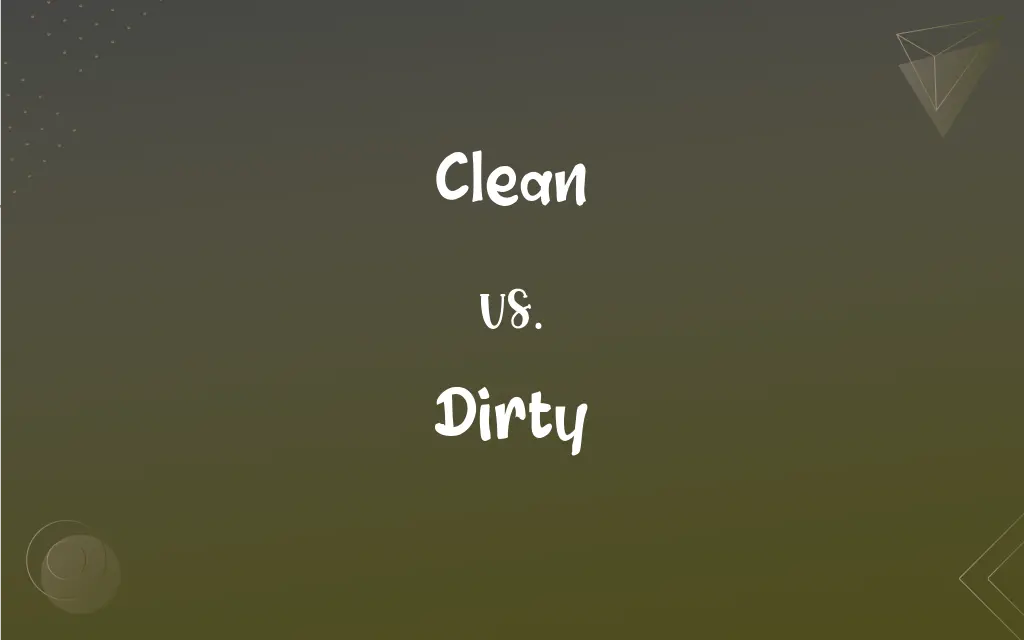Clean vs. Dirty: What's the Difference?
Edited by Janet White || By Harlon Moss || Published on January 1, 2024
Clean refers to being free from dirt, marks, or impurities, while dirty means having or covered in dirt, stains, or contaminants.

Key Differences
Clean signifies a state of being free from dirt, pollutants, or unwanted matter, implying hygiene and tidiness. In contrast, dirty is characterized by the presence of dirt, grime, or impurities, often indicating a lack of cleanliness or maintenance.
The concept of clean often conveys a sense of orderliness and purity, essential in contexts like health care and food preparation. Dirty, on the other hand, implies a state of contamination or pollution, which can be undesirable in many settings, particularly where hygiene is paramount.
In a broader sense, clean also symbolizes moral or ethical purity, often used metaphorically to describe incorruptibility. Dirty, in a metaphorical sense, can represent corruption, indecency, or moral impurity, extending beyond just physical cleanliness.
In environmental contexts, clean denotes the absence of pollutants and a state of environmental health, as in 'clean air' or 'clean energy.' Conversely, dirty often relates to environmental degradation, such as 'dirty industries' or 'dirty fuels,' highlighting pollution and ecological harm.
In everyday language, clean is associated with freshness, neatness, and often a pleasing aesthetic, like a clean design. Dirty is frequently linked with messiness, disorder, and can carry a negative aesthetic connotation, as seen in phrases like 'dirty laundry' or 'dirty streets.'
ADVERTISEMENT
Comparison Chart
Connotation
Hygienic, pure, orderly
Contaminated, polluted, disordered
Physical State
Free from dirt, stains, or impurities
Covered with or containing dirt or grime
Metaphorical Use
Moral purity, incorruptibility
Corruption, indecency, moral impurity
Environmental Context
Absence of pollutants, eco-friendly
Pollution, ecological harm, non-eco-friendly
Aesthetic Implication
Freshness, neatness, pleasing design
Messiness, disorder, negative aesthetic
ADVERTISEMENT
Clean and Dirty Definitions
Clean
Clean means free from dirt, marks, or stains.
The room was clean and well-organized.
Dirty
In a figurative sense, dirty suggests unethical or unfair practices.
He was accused of playing dirty in business deals.
Clean
In a moral context, clean suggests honesty and fairness.
His record is clean, with no history of misconduct.
Dirty
Dirty can imply being filled with or exposed to dirt or pollution.
The industrial area was known for its dirty air.
Clean
Clean can mean thorough or complete, as in cleaning.
He did a clean sweep of his apartment.
Dirty
Dirty can describe something sullied by crime or wrongdoing.
The investigation uncovered dirty money in the company.
Clean
Clean in sports implies playing by the rules.
The game was hard-fought but clean.
Dirty
Dirty means covered or marked with an unwanted substance.
His clothes were dirty after gardening.
Clean
Clean also refers to not containing harmful substances.
She prefers to eat clean, organic foods.
Dirty
Dirty also refers to something sexually explicit or indecent.
The comedian's act was full of dirty jokes.
Clean
Free from dirt, stain, or impurities; unsoiled
A clean kitchen floor.
Clean clothes.
Dirty
Covered or marked with dirt or an unwanted substance; unclean.
FAQs
Can "dirty" have a positive connotation?
Generally, dirty is seen negatively, though it can be used positively in some contexts, like a "dirty" musical sound in blues or rock.
What does "dirty" mean in politics?
In politics, dirty often refers to unethical, underhanded tactics or corruption.
What does "clean" mean in environmental terms?
In environmental terms, clean refers to being free of pollutants and ecological harm.
Is "clean" only a physical state?
No, clean can also refer to moral or ethical purity, as well as completeness in an action.
Can "dirty" describe music?
Yes, in music, dirty can describe a gritty, raw sound, often found in genres like rock or blues.
Can "clean" refer to a taste or smell?
Yes, clean can describe a fresh, unspoiled taste or smell.
Is "dirty" used in technology?
Yes, in technology, dirty can refer to corrupted data or unclean coding practices.
What does "clean fuel" refer to?
Clean fuel typically refers to energy sources that emit low or no pollutants.
What does a "clean" design mean?
A clean design is minimalist, uncluttered, and aesthetically pleasing.
What is a "dirty bomb"?
A dirty bomb is a weapon that combines conventional explosives with radioactive material.
Can something be clean but not hygienic?
Yes, something can appear clean but still harbor germs or bacteria.
Can "clean" be used in finance?
Yes, in finance, clean refers to transactions or funds that are legal and legitimate.
What is a "clean slate"?
A clean slate is a fresh start, free from past mistakes or problems.
Does "dirty" always imply negativity in art?
Not always; in art, dirty can refer to a style that is raw, authentic, and emotive.
What does "dirty money" mean?
Dirty money refers to funds obtained through illegal or unethical means.
Is there "clean comedy"?
Yes, clean comedy avoids explicit content and offensive material.
What is "clean eating"?
Clean eating refers to consuming whole, unprocessed foods.
Is "dirty laundry" always literal?
No, "dirty laundry" can also metaphorically refer to private issues or scandals.
Does "dirty work" mean physically dirty tasks?
Not necessarily; "dirty work" often refers to unpleasant but necessary tasks, which may be ethical or unethical.
Can "dirty" refer to a feeling?
Yes, someone can feel dirty, implying a sense of guilt or shame.
About Author
Written by
Harlon MossHarlon is a seasoned quality moderator and accomplished content writer for Difference Wiki. An alumnus of the prestigious University of California, he earned his degree in Computer Science. Leveraging his academic background, Harlon brings a meticulous and informed perspective to his work, ensuring content accuracy and excellence.
Edited by
Janet WhiteJanet White has been an esteemed writer and blogger for Difference Wiki. Holding a Master's degree in Science and Medical Journalism from the prestigious Boston University, she has consistently demonstrated her expertise and passion for her field. When she's not immersed in her work, Janet relishes her time exercising, delving into a good book, and cherishing moments with friends and family.






































































